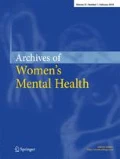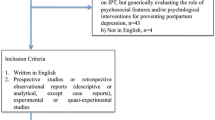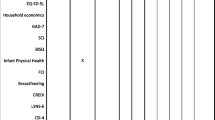Abstract
This study is a randomised controlled trial comparing outcomes from an 8-week Interpersonal Psychotherapy group (IPT-G) for postnatal depression with ‘treatment as usual’ (TAU), conducted in a routine community setting in the Australian Capital Territory (ACT). Eligible women were recruited and randomly assigned to either IPT-G or TAU conditions. This study compared outcomes on such variables as depressive symptoms, marital adjustment, social support and mother–infant bond at baseline, mid-treatment, end-of-treatment and 3 months follow-up. Participants were also independently assessed using the Hamilton Depression Rating Scale (HAM-D). 50 women completed baseline assessments and were included in the analysis. Comparisons of treatment conditions showed that by end of treatment both the TAU and IPT-G groups significantly improved in terms of mean depression scores, however, the IPT-G women improved significantly more and had continued improvements at 3 months post therapy. Furthermore, women who received IPT-G displayed significant improvement in terms of marital functioning and perceptions of the mother-infant relationship compared to TAU participants. These findings highlight the potential benefits of an interpersonally based treatment, which not only improves outcomes for the mother but also potentially for the couple and the infant when compared to usual care.

Similar content being viewed by others
References
Appleby L, Warner R, Whitton A, Faragher B (1997) A controlled study of fluoxetine and cognitive-behavioural counselling in the treatment of postnatal depression. BMJ 314:932–936
Australian Bureau of Statistics. (2005) 2005 Year book Australia, Cat no. 1301.0 ABS, Canberra
Beck CT (1996) A meta-analysis of predictors of postpartum depression. Nurs Res 45:297–303
Beck CT (2001) Predictors of postpartum depression: an update. Nurs Res 50:275–285
Beck AT, Steer RA, Brown GK (1996) Manual for the Beck depression inventory-II. Psychological Corporation, San Antonio
Boyce PM, Stubbs JM (1994) The importance of postnatal depression. Med J Aust 161(8):471–472
Boyle MH, Pickles AR (1997) Influence of maternal depressive symptoms on ratings of childhood behaviour. J Abnormal Child Psych 25:399–412
Brockington IF, Oates J, George S, Turner D, Vostanis P (2001) A screening questionnaire for mother–infant bonding disorders. Arch Womens Ment Health 3:133–140
Brown GW, Harris T (1978) Social origins of depression. Tavistock, London
Brugha TS, Wheatley S, Taub NA, Culverwell A, Friedman T, Kirwan P (2000) Pragmatic randomised trial of antenatal intervention to prevent post-natal depression by reducing psychosocial risk factors. Psychol Med 30:1273–1281
Buist A, Westley D, Hill C (1999) Antenatal prevention of postnatal depression. Arch Womens Ment Health 1:167–173
Carter FA, Carter JD, Luty SE, Wilson DA, Frampton CM, Joyce PR (2005) Screening and treatment for depression during pregnancy: a cautionary note. Aust NZ J Psychiatry 39:255–261
Chabrol H, Teissedre F, Saint-Jean M, Teisseyre N, Roge B, Mullet E (2002) Prevention and treatment of post-partum depression: a controlled randomized study on women at risk. Psych Med 32(6):1039–1047
Clark R, Tluczek A, Wenzel A (2003) Psychotherapy for postpartum depression: a preliminary report. Am Jo Orthopsychiatry 73(4):441–454
Cohen (1985) Measuring the functional components of social support. In: Sarason IG, Sarason BR (eds) Social support: Theory, research and applications. Martinus Nijhoff, Dordrecht, pp 73–94
Cooper PJ, Murray L (1995) Course and recurrence of postnatal depression. Evidence for the specificity of the diagnostic concept. Br J Psychiatry 166:191–195
Cooper PJ, Murray L (1997) Prediction, detection, and treatment of postnatal depression. Arch Dis Child 77:97–99
Cooper PJ, Murray L (1998) Postnatal depression. Br Med J 316(7148):1884–1886
Cooper PJ, Murray L, Wilson A et al (2003) Controlled trial of the short and long-term effect of psychological treatment of postpartum depression. 1. Impact on maternal mood. Br J Psychiatry 182:412–419
Cox JL, Connor Y, Kendall RE (1982) Prospective study of the psychiatric disorders of childbirth. Br J Psychiatry 140:111–117
Cox JL, Holden JM, Sagovsky R (1987) Detection of postnatal depression: development of the 10-item Edinburgh postnatal depression scale. Br J Psychiatry 150:782–786
Coyne JC, Gotlib IH (1983) The role of cognition in depression: a critical analysis. Psychol Bull 94:472–505
Craig RJ, Olson RE (2005) On the decline of MCMI-based research. In: Craig RJ (ed) New directions in interpreting the Millon Clinical Multiaxial Inventory-III. Wiley, Hoboken, pp 284–289
Cuijpers P, Brannmark JG, van Straten A (2008) Psychological treatment of postpartum depression: a meta-analysis. Jo Clin Psych 64(1):103–118
Dennis CL (2004) Treatment of postpartum depression, part 2: a critical review of nonbiological interventions. J Clin Psychiatry 65(9):1252–1265
Dennis CL, Letourneau N (2007) Global and relationship-specific perceptions of support and the development of postpartum depressive symptomatology. Soc Psychiatry Psychiatr Epidemiol 42(5):389–395
Dennis CL, Ross L (2006) Women’s perception of partner support and conflict in the development of postpartum depressive symptoms. J Adv Nurs 56(6):588–599
Elliott SA, Leverton TJ, Sanjack M et al (2000) Promoting mental health after childbirth: a controlled trial of primary prevention of postnatal depression. Br J Clin Psychol 39(3):223–241
Enkin MW (1994) One sided tests should be used more often. Br Med J 309:873–874
Fleming AS, Klien E, Corter C (1992) The effects of a social support group on depression, maternal attitudes and behaviour in new mothers. J Child Psych Psychiatry 33(4):685–698
Forman DR, O’Hara MW, Stuart S, Gorman LL, Larsen KE, Coy KC (2007) Effective treatment for postpartum depression is not sufficient to improve the developing mother–child relationship. Dev Psychopathol 19:585–602
Frank E, Prien RF, Jarrett RB et al (1991) Conceptualization and rationale for consensus definitions of terms in major depressive disorder: remission, recovery, relapse and recurrence. Arch Gen Psychiatry 48:851–855
Goodman SH, Gotlib IH (1999) Risk for psychopathology in the children of depressed mothers: a developmental model for understanding mechanisms of transmission. Psychol Rev 106(3):458–490
Goodman SH, Gotlib IH (eds) (2002) Children of depressed parents: Alternative pathways to risk for psychopathology. American Psychological Association, Washington, DC
Gotlib IH, Whiffen VE, Wallace PM, Mount JH (1991) Prospective investigation of postpartum depression: factors involved in onset and recovery. J Abnorm Psychol 100:122–132
Hamilton M (1960) A rating scale for depression. J Neurol Neurosurg Psychiatry 23:56–62
Holden JM (1991) Postnatal depression: its nature, effects, and identification using the Edinburgh postnatal depression scale. Birth 18(4):211–221
Holden J, Sagovsky R, Cox J (1989) Counselling in a general practice setting: controlled study of health visitor intervention in treatment of postnatal depression. BMJ 298:223–226
Holopainen D (2002) The experience of seeking help for postnatal depression. Aust J Adv Nurs 19(3):39–44
Howell DC (1997) Statistical methods for psychology, 4th edn. Duxbury, California
Josefsson A, Sydsjo G (2007) A follow-up study of postpartum depressed women: recurrent maternal depressive symptoms and child behavior after four years. Arch Womens Ment Health 10(4):141–145
Klerman G, Weissman MM, Rounsaville B, Chevron E (1984) Interpersonal psychotherapy of depression. Basic Books, New York
Klier CM, Muzik M, Rosenblum KL, Lenz G (2001) Interpersonal psychotherapy adapted for the group setting in the treatment of postpartum depression. J Psychother Pract Res 10(2):124–131
Kumar R, Robson KM (1984) A prospective study of emotional disorders in childbearing women. Br J Psychiatry 144:35–47
Matthey S (2004) Calculating clinically significant change in postnatal depression studies using the Edinburgh postnatal depression scale. J Affect Disord 78:269–272
Matthey S, Kavanagh DJ, Howie P, Barnett B, Charles M (2004) Prevention of postnatal distress or depression: an evaluation of an intervention at preparation for parenthood classes. J Affect Disord 79:113–126
Mauthner NS (1995) Postnatal depression: the significance of social contacts between mothers. Womens Stud Int Forum 18(3):311–323
Meager I, Milgrom J (1996) Group treatment for postpartum depression: a pilot study. Aust NZ J Psychiatry 30:852–860
Milgrom J, Erikson J, McCarthy R, Gemmill AW (2005a, September) Treating the parent–infant relationship following postnatal depression: Severity and malleability. Paper presented at the meeting of the Australasian Marcé Society Conference; Melbourne, Australia
Milgrom J, Negri LM, Gemmill AW, McNeil M, Martin PR (2005b) A randomised controlled trial of psychological interventions for postnatal depression. Br J Clin Psychol 44(4):529–542
Millon T, Millon C, Davis R (1994) The Millon Clinical Multiaxial Inventory manual (3rd ed). National Computer Systems, Minnesota, USA
Millon T, Davis R, Millon C (1997) Millon Clinical Multiaxial Inventory: MCMI-III manual, 2nd edn. NCS Pearson, Minneapolis
Misri S, Kostaras X, Fox D et al (2000) The impact of partner support in the treatment of postnatal depression. Can J Psychiatry 45(6):554–558
Misri S, Reebye P, Corral M, Milis L (2004) The use of paroxetine and cognitive-behavioral therapy in postpartum depression and anxiety: a randomized controlled trial. J Clin Psychiatry 65:1236–1241
Moehler E, Brunner R, Wiebel A, Reck C, Resch F (2006) Maternal depressive symptoms in the postnatal period are associated with long-term impairment of mother–infant bonding. Arch Wom Ment Health 9:273–278
Morgan M, Matthey S, Barnett B, Richardson C (1997) A group programme for postnatally distressed women and their partners. J Adv Nurs 26:913–920
Muller ME (1994) A questionnaire to measure mother–infant interaction. J Nurs Meas 2(2):129–141
Murray L, Cooper PJ, Wilson A, Romaniuk H (2003) Controlled trial of the short- and long-term effect of psychological treatment of post-partum depression: 2. Impact on the mother–child relationship and child outcome. Br J Psychiatry 182:420–427
O’Hara MW (2002) Psychotherapy for postpartum depression: Are the effects enduring?. Plenary session at the Marce Society International Scientific Meeting Sydney, Australia
O’Hara M, Swain A (1996) Rates and risk of postpartum depression—a meta-analysis. Int Rev Psychiatry 8:37–54
O’Hara MW, Rehm LP, Campbell SB (1983) Postpartum depression: a role for social network and life stress variables. J Nerv Ment Disord 171:336–341
O’Hara MW, Neunaber DJ, Zekoski EM (1984) Prospective study of postpartum depression: prevalence, course and predictive factors. J Abnorm Psychol 93(2):158–171
O’Hara MW, Stuart S, Gorman LL, Wenzel A (2000) Efficacy of interpersonal psychotherapy for postpartum depression. Arch Gen Psychiatry 57:1039–1045
Parker G, Parker I, Brotchie H, Stuart S (2006) Interpersonal psychotherapy for depression? The need to define its ecological niche. J Affective Dis 95:1–11
Pearlstein TB, Zlotnick C, Battle CL, Stuart S, O’Hara MW, Price AB, Grause MA, Howard M (2006) Patient choice of treatment for postpartum depression: a pilot study. Arch Womens Ment Health 9(6):303–308
Reay R, Fisher Y, Robertson M, Adams E, Owen C, Kumar R (2006) Group interpersonal psychotherapy for postnatal depression: a pilot study. Arch Womens Ment Health 9(1):31–39
Robinson S, Young J (1982) Screening for depression and anxiety in the post-natal period: acceptance or rejection of a subsequent treatment offer. Aust NZ J Psychiatry 16(2):47–51
Ross LE, Sellers EM, Gilbert Evans SE, Romach MK (2004) Mood changes during pregnancy and the postpartum period: development of a biopsychosocial model. Acta Psychiatr Scand 109:457–466
Shadbolt B, Wang R, Craft PS (2004) Moving to an on-line framework for knowledge-driven health care. In: Wickramasinghe N, Gupta J, Sharma S (eds) Creating knowledge based healthcare organizations. Ideas Group, Hershey
Spanier G (1976) Measuring dyadic adjustment: new scales for assessing the quality of marriage and similar dyads. Jo Marriage Family 38:15–28
Stuart S, O’Hara MW (1995) Interpersonal psychotherapy for postpartum depression: a treatment program. J Psychother Pract Res 4:18–29
Stuart S, Robertson M (2003) Interpersonal psychotherapy: A clinician’s guide. Edward Arnold, London
Vinogradov S, Yalom ID (1990) Self-disclosure in the therapeutic relationship. Plenum & Yalom, New York
Weissman M, Bothwell S (1976) The assessment of social adjustment by patient self report. Arch Gen Psychiatry 33(9):1111–1115
Weissman MM, Pilowsky DJ, Wickramaratne PJ, Talati A, Wisniewski SR, Fava M et al (2006) Remissions in maternal depression and child psychopathology. J Am Med Assoc 295:1389–1398
Whitton A, Appleby L (1996) Maternal thinking and the treatment of postnatal depression. Int Rev Psychiatry 8:73–78
Wilfley DE, Agras WS, Telch CF, Rossiter E, Schneider J, Cole AC, Sifford L, Raeburn S (1993) Group cognitive-behavioral therapy and group interpersonal psychotherapy for the nonpurging bulimic individual: a controlled comparison. J Consult Clin Psych 61:296–305
Wilfley DE, Mackenzie KR, Welch R, Ayres V, Weissman MM (2000) Interpersonal psychotherapy for group. Basic Books, New York
Williams JB (1988) A structured interview guide for the Hamilton depression rating scale. Arch Gen Psychiatry 45:742–747
Zimmerman M, Chelminski I, Posternak M (2004) A review of studies of the Hamilton depression rating scale in healthy controls: implications for the definition of remission in treatment studies of depression. J Nerv Ment Dis 192:595–601
Acknowledgements
We would like to thank all the women and their partners who participated in this study. We are also deeply grateful to the postgraduate psychology students that assisted with the study and for Bruce Shadbolt’s assistance with the computerised randomisation and data management system. We thank the many health professionals and organisations, such as Mental Health ACT, who supported this research.
Author information
Authors and Affiliations
Corresponding author
Rights and permissions
About this article
Cite this article
Mulcahy, R., Reay, R.E., Wilkinson, R.B. et al. A randomised control trial for the effectiveness of group interpersonal psychotherapy for postnatal depression. Arch Womens Ment Health 13, 125–139 (2010). https://doi.org/10.1007/s00737-009-0101-6
Received:
Accepted:
Published:
Issue Date:
DOI: https://doi.org/10.1007/s00737-009-0101-6




